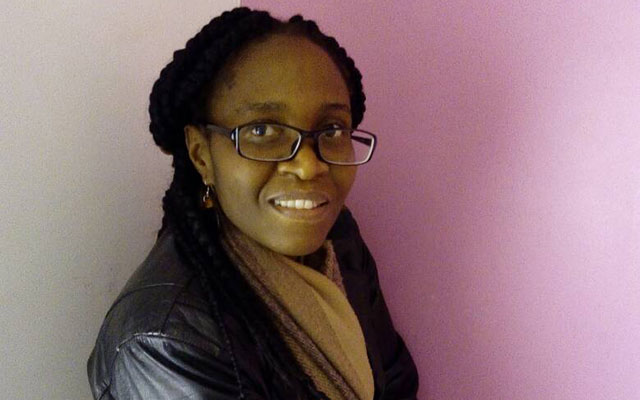When one’s soul is worth R50


Tsitsi Nomsa Ngwenya
Elliot Ziwira @ The Book Store
There are so many books to pick from here at the Bookstore. So many books to bury myself in and forget about the worries of this world; which is not my home anyway as Jim Reeves croons in “Across the Bridge”.
But does one really suspend one’s suffering?
There is so much hurt and hate about, so much frustration and despondency, so much poverty; the poverty of the soul.
Everybody seems to be running away from something; such a stampede really. But where are they going, and what are they escaping from? Can it not be a case of jumping from the frying pan right into the fire?
Am taken aback by the trek down south; the south, where honey oozes from any crevice in sight and gold dust covers one’s shoes in summer. Egoli, the land of gold; where dreams are fashioned and grapevines stretch as far as the eye can see and beyond.
But are things really the way they seem? Well, I do not want to let my mind wander much into unknown territory. Seeing that I am not a much travelled man; I am a man of the book, you see. I use books to travel to many lands, and have read so many books about faraway lands; so maybe I am well travelled; indeed I am.
My first contact with South Africa was through Allan Paton’s “Cry, the Beloved Country” (1948), then Es’kia Mphahlele’s “Down Second Avenue” (1959), ooh that book, I still quote from the masterpiece more than two decades after reading it. Peter Abrahams’ “Mine Boy” (1946), gosh, how the author draws you in through characterisation, imagery, setting and metaphor, until you think and feel only like you should – the feeling of being oppressed; dying inside, yet remaining hopeful.
I must say I fell in love with the resilience of the people of colour as they struggled to find meaning in their toils for existence as beggars on beaches of gold. The crestfallenness, frustration, deceit and suffering depicted in Kagiso Lesego Molope’s “Dancing in the Dust” (2002), watered down my heart, but the hope created through resolute unity of purpose makes the difference, and I must say there is always hope in expectation.
South Africa, the Rainbow Nation, but is it as colourful as it is portrayed? What the media says, what my relatives and friends say through their experiences there, calls for deeper soul searching.
Am drawn to Tsitsi Nomsa Ngwenya’s “The Fifty Rand Note” (2017), and I feel the urge to be hoist to eGoli from another perspective, a Zimbabwean perspective, a traveller’s vantage point, and dear reader I will take you along with me.
There is so much significance in the rand, the 50 rand especially. It evokes so many memories of the hyperinflationary era in the Motherland that heightened the trek Down South, and I, like you, was caught up in it in one way or the other.
Ngwenya’s “The Fifty Rand Note” explores the nature of dreams in respect to time and place. Dreams in their nature are meaningless if dreamland itself remains a dream, so it seems. One has to conjure a base for dreams to be realised, without which hope remains in abeyance. Hope is an ingredient we cannot do without.
Through adept characterisation, masterful use of language, setting, use of the autobiographical mode and an avant garde style; combining realism, romanticism, the picaresque, pastoralism and the epistolary mode, Ngwenya is able to create individual episodes which interact and merge into a national discourse of hope in the face of adversity. The frustration is so real, so thick you cut it with a knife.
In the title story “The Fifty Rand Note”, Nomsa Ngwenya hoists the reader on a whirlwind voyage of intrigue, suspense and surprise through the lenses of a traveller. The first person singular narrative voice used draws the reader into the writer’s space where deceit, violence, morality, hope and expectation wear the face of a 50 rand note.
The narrator tells us: “I am walking leisurely with my niece Ntombi and nephew Philani, down Vard Merwe Avenue. A street advert catches my eye: ‘Get rich charms, Sangoma from Chipinge, Zimbabwe’.” Here the reader takes a deep breath; how really can one run away from the poverty that stalks him perpetually to create millionaires in a foreign land? Charlatan, you might say, but are we really done with charlatanism at home? There are so many prophets and n’angas in our backyard, but there seem to be no collective vision to take us to Utopia.
The narrator, who is a businesswoman haunted by debts and impatient employees is in South Africa “to follow up on clients and investors”. She takes the reader into her worries as a businessperson whose fortunes are waning, giving vent to another form of vulnerability, which is usually ignored when writers talk of suffering and oppression; the voice of the employer whom everyone feels obliged to hate.
She wilts inside: “I am hounded. Creditors want to be paid. The bank has no money. Service providers have gone to lawyers, debt collectors. Employees have not reported to work yet. Most employers live on their nerves as it is difficult to manage people you have not paid.”
It is harrowing, heart-rending and disheartening to walk beside the narrator, as she trudges along the steep terrain of hope where the Zimbabwean is known for all the wrong reasons; from being violent, deceitful, immoral and thievish, in spite of everything to the contrary. Professions are traded for menial jobs, as loved ones home want to be fed and the host country is unyielding.
Like Mphahlele in “Down Second Avenue”, Ngwenya explores the metaphor of the bright lights of Johannesburg, albeit in a refreshing way. “Bright colours, bright lights, gold teeth, knives and guns. Johannesburg”, the narrator shudders.
The irony of colourful brightness and the deceitful nature of the gold teeth bring a false ambiance of affluence, which contrasts with violence and death symbolised by the death merchants brandishing knives and guns; and the beautiful women of the night, who charge “fifty rand for those using protection and hundred rand for the ‘live’ encounter”, thus “the difference between life and death is a fifty rand note”.
Through the use of the autobiographical mode which follows her own experiences, Ngwenya purveys a plethora of thematic issues, cutting across religion, culture, politics, marriage, womanhood and hunting in foreign lands. Her stories are told mostly in the first person female voice, save for only two stories “The Prisoner” and “The Golden Breast”. The sustained motif of the journey and imprisonment pervade Ngwenya’s stories.
One cannot help feeling for the women who people Ngwenya’s stories, as they fight against odds to put food on the table for their offspring as well as siblings and the extended family. The writer gives new meaning to responsibility and the family unit, where expectations are high on many fronts, patience is in short supply, and emotions run riot, as in the stories “Yesterday Morning” and “A Dollar for Two”.
The great trek south does not always yield meaningful returns as is explored in “Uncle Njabulo’s Return”, it instead destroys marriages and banes the family unit. The narrator’s uncle, Njabulo, has been away in eGoli for 15 years, but on his return he brings nothing except his horrible and despicable self to his wife and two children, Bokani and Hanani, whom he has abandoned. His children feel that they are better off without him, as they constantly ask their mother and grandfather if indeed he is their father and when he is going back to his base.
What a touching story of love and neglect it is. Ironically, Njabulo is only able to return to South Africa after his wife Senzeni sells a “set of goats to the goat hustler”. The narrator tells us: “Even though there was no money for Bokani and Hanani’s uniforms, we were all glad when uncle Njabulo returned to Johannesburg, leaving his wife expecting twins.” Expectancy indeed wears so many shades.
Although women are emotionally, psychologically and physically oppressed, as seen through the characters who are either single mothers, in polygamous marriages or loveless monogamous unions there is hope in the stories “Let me tell You”, “No Boundaries”, “My Wedding” and “My King and Priest”. Verily, love knows no boundaries and conquers all, if Cupid’s arrow strikes the right target.
On the flipside, however, the atrocious editing of the book leaves a lot to be desired, as the glaring grammatical errors are embarrassing, to say the least. Also, 20 pages is not my idea of a short story; characters and themes tend to be bloated.
The other downside is over-reliance on the autobiographical mode, which somehow limits creativity, as the temptation for self-justification becomes high. The first person narrator in both urban and rural settings can be read as one, which affects creative interfaces. “Uncle Njabulo’s Return”, for instance, could have been better told by his wife, Senzeni, one of his children, or a third person narrator, instead of a detached nameless first person narrator, who purports to be both omniscient and omnipresent.
Although women seek to find solutions out of their imprisonment they seem to remain entangled in the whims of men, their “kings and priests”, thus love can be read as a means of escape and a route to oppression at the same time. Through inter-cultural marriages; love with no boundaries, women abandon their businesses or home, leaving them at the mercy of predators. This appears to be abandonment of obligation read in reverse. Are South African men, glorified as knights in shining armour, really flawless, as portrayed in “My King and Priest” and “No Boundaries”? One wonders. Such is the nature of love.
Notwithstanding the teething glitches highlighted, Tsitsi Nomsa Ngwenya’s “The Fifty Rand Note” (2017) remains an evocative, enthralling and hilarious rhapsody of hope, resilience and resolute battle of emotions. A must read for serious searchers of intellectual and entertaining catharsis.









Comments